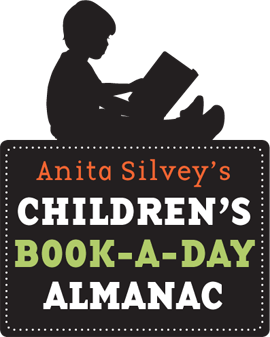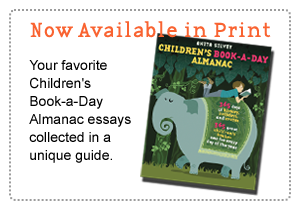
A FEW OTHER EVENTS FOR
MAY 21:
- Happy birthday Beverley Naidoo (Journey to Jo’burg), Erica Silverman (Cowgirl Kate and Cocoa) and Bonnie Bryant (Saddle Club series).
- It’s the birth date of Virginia Haviland (1911-1988), The Fairy Tale Treasury.
- On this day in 1881, the American Red Cross is established by Clara Barton. Read Clara Barton: Founder of the American Red Cross by Christin Ditchfield.
On May 21, 1904, the Fédération Internationale de Football Association (FIFA) was founded in Paris. Today the Fédération administers the World Cup. What the rest of the world calls “football” has been renamed soccer in the United States. Over the last decade, because of soccer’s obvious advantages—an exciting game, team play, and inexpensive equipment—the sport has been embraced by American children. Consequently, a lot of books about this sport have been published.
But if I could choose only one, it would have to be Edward Bloor’s 1997 masterpiece, Tangerine. Bloor brilliantly explores so many things in this book—sibling relationships, sports drama, the environment, and the tensions of race and economic class. He also creates Paul Fisher, one of the most endearing sports heroes in the children’s literature cannon. In the seventh grade Paul and his family move to Tangerine, Florida—once a citrus paradise. But the groves of trees have been burned and new housing developments placed over them. However, because of destruction to the native environment, these new residential areas face severe problems like muck fires that constantly burn, or termites that eat their way out of tree roots. Torrential rains happen every afternoon; lightning strikes all the time, sometimes even killing children. Into this disordered landscape, Paul and his highly dysfunctional family immediately begin to add to the chaos.
Paul’s father pursues the Eric Fisher Football Dream, doing everything in his power to advance the career of Paul’s high school age sibling, Eric. Paul’s mother butts her nose into everyone’s business, but ignores what goes on in her own family. Eric, a truly evil older brother, continues to make Paul’s life hell. Paul himself just wants to fit in and find a community.  Soccer has always been Paul’s saving grace, even though he borders on being legally blind. Special goggles have made it possible for him to play the goalie position despite his poor eyesight.
When part of Paul’s school literally disappears into a sinkhole, he uses the situation as an opportunity to gain admittance to another middle school in a rougher neighborhood. That school possesses a superior soccer program, and Paul’s tenacity gains the team’s approval. Now he plays with a group who sees soccer as war—war against all opposing teams, particularly those of their more privileged neighbors.
Magnificent scenes take place in tangerine groves, and the soccer action will keep all sports fans happily turning the pages. But the mystery behind the story—how Paul lost his sight—and the consequences of ignoring the devastation to the environment allow this book to work on many different levels for young readers ages twelve through fourteen.
In short Bloor has written an unforgettable literary sports novel—great content, great characters, and great sports action. Readers love Paul’s tenacity and his eventual triumph over adversity. As he says, “Maybe I am just a sub, maybe I am just along for the ride, but this is the greatest thing that has ever happened to me.”
Here’s a passage from Tangerine:
Those are the statistics of this soccer season. But I have to describe the feelings that this has given me. It’s not enough to say that we have won seven soccer games in a row. It’s how we’ve done it that is so extraordinary. The War Eagles have set out on a bloody rampage through the county. We have destroyed every enemy. We have laid waste to their fields and their fans. There is fear in their eyes when we come charging off our bus, whooping our war cry. They are beaten by their own fear before the game even begins.
Originally posted May 21, 2012. Updated for .













Thank you for highlighting this amazing book, and reminding me why it is one of my all-time favorite middle school novels. I especially enjoyed Paul’s relationships with the hispanic kids whose parents tend the tangerine groves. I shared this one with my adult book club, and it gave us so much to talk about.
Mary– Yes, this works well with children and adults!
I loved this book! I think I liked it so much because I taught in central Florida for a while and could relate to the area and the culture. The rising 7th graders at my school are reading it for summer reading.
This is a fabulous book that I hadn’t thought about since I read it as a kid, but the shivers and surprises it gave me are still so enjoyable, I’m going to my library later today to get this book and reread it.